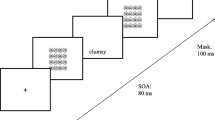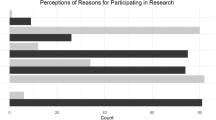Abstract
Very little is known about whether and how socioemotional factors influence age differences in associative memory. Here, we tested the hypothesis that reducing the threat induced by age-based stereotypes can reduce age differences in learning performance and strategy. Using an associative learning task, we replicated the classic finding of age differences under a high-threat condition: older adults had longer reaction times than younger adults and were much more reluctant to use memory retrieval. However, age differences were greatly diminished under a low-threat condition. These findings demonstrate that memory retrieval is an ability not entirely lost as individuals age because merely reducing stereotype threat helped restoring it. We conclude that socioemotional factors, such as stereotype threat, should be considered when evaluating younger and older adults’ memory performance.



Similar content being viewed by others
Notes
Overall accuracy was close to the instructed 95% level, but slightly lower for older than for younger adults (.92 vs. .96), F(1, 76) = 34.12, p < .001, ηp2 = .31. Threat condition and practice did not influence accuracy, nor interacted with age group.
References
Ackerman, P. L., & Woltz, D. J. (1994). Determinants of learning and performance in an associative memory/substitution task: Task constraints, individual differences, volition, and motivation. Journal of Educational Psychology, 86(4), 487–515. https://doi.org/10.1037/0022-0663.86.4.487
Armstrong, B., Gallant, S. N., Li, L., Patel, K., & Wong, B. I. (2017). Stereotype threat effects on older adults’ episodic and working memory: A meta-analysis. The Gerontologist, 57(suppl_2), S193–S205. https://doi.org/10.1093/GERONT/GNX056
Barber, S. J. (2017). An examination of age-based stereotype threat about cognitive decline. Perspectives on Psychological Science, 12(1), 62–90. https://doi.org/10.1177/1745691616656345
Barber, S. J., & Mather, M. (2013). Stereotype threat can both enhance and impair older adults’ memory. Psychological Science, 24(12), 2522–2529. https://doi.org/10.1177/0956797613497023
Beilock, S. L., & DeCaro, M. S. (2007). From poor performance to success under stress: Working memory, strategy selection, and mathematical problem solving under pressure. Journal of Experimental Psychology: Learning Memory and Cognition, 33(6), 983–998. https://doi.org/10.1037/0278-7393.33.6.983
Ben-Zeev, T., Fein, S., & Inzlicht, M. (2005). Arousal and stereotype threat. Journal of Experimental Social Psychology, 41(2), 174–181. https://doi.org/10.1016/J.JESP.2003.11.007
Blascovich, J., Spencer, S. J., Quinn, D., & Steele, C. (2001). African Americans and high blood pressure: The role of stereotype threat. Psychological Science, 12(3), 225–229. https://doi.org/10.1111/1467-9280.00340
Bonin, P., Méot, A., Aubert, L.-F., Malardier, N., Niedenthal, P. M., & Capelle-Toczek, M.-C. (2003). Normes de concrétude, de valeur d’imagerie, de fréquence subjective et de valence émotionnelle pour 866 mots. L’Année Psychologique, 103(4), 655–694. https://doi.org/10.3406/PSY.2003.29658
Brubaker, M. S., & Naveh-Benjamin, M. (2018). The effects of stereotype threat on the associative memory deficit of older adults. Psychology and Aging, 33(1), 17–29. https://doi.org/10.1037/pag0000194
Cadinu, M., Maass, A., Rosabianca, A., & Kiesner, J. (2005). Why do women underperform under stereotype threat? Psychological Science, 16(7), 572–578. https://doi.org/10.1111/J.0956-7976.2005.01577.X
Castel, A. D. (2005). Memory for grocery prices in younger and older adults: The role of schematic support. Psychology and Aging, 20(4), 718–721. https://doi.org/10.1037/0882-7974.20.4.718
Crum, R. M., Anthony, J. C., Bassett, S. S., & Folstein, M. F. (1993). Population-based norms for the Mini-Mental State Examination by age and educational level. JAMA, 269(18), 2386–2391. https://doi.org/10.1001/JAMA.1993.03500180078038
Deltour, J. J. (1993). Echelle de vocabulaire de Mill Hill de JC Raven. Adaptation française et normes européennes du Mill Hill et du Standard Progressive Matrices de Raven (PM38). Braine-le-Château: Editions l’application des techniques modernes.
Duarte, A., & Dulas, M. R. (2020). Episodic memory decline in aging. In The Cambridge handbook of cognitive aging: A life course perspective (pp. 200–217). Cambridge University Press. https://doi.org/10.1017/9781108552684.013
Dutrévis, M., & Croizet, J.-C. (2005). Reputation of intellectual inferiority undermines memory efficiency among college students. Current Research in Social Psychology, 10, 104–115. https://psycnet.apa.org/record/2015-11200-001
Ferrand, L., & Alario, F. X. (1998). Normes d’associations verbales pour 366 noms d’objets concrets. L’Année Psychologique, 98(4), 659–709. https://doi.org/10.3406/PSY.1998.28564
Folstein, M. F., Folstein, S. E., & McHugh, P. R. (1975). “Mini-mental state”. A practical method for grading the cognitive state of patients for the clinician. Journal of Psychiatric Research, 12(3), 189–198. https://doi.org/10.1016/0022-3956(75)90026-6
Harkins, S. G. (2006). Mere effort as the mediator of the evaluation-performance relationship. Journal of Personality and Social Psychology, 91(3), 436–455. https://doi.org/10.1037/0022-3514.91.3.436
Hertzog, C., Touron, D. R., & Hines, J. C. (2007). Does a time-monitoring deficit influence older adults’ delayed retrieval shift during skill acquisition? Psychology and Aging, 22(3), 607–624.
Hess, T. M., Auman, C., Colcombe, S. J., & Rahhal, T. A. (2003). The impact of stereotype threat on age differences in memory performance. The Journals of Gerontology: Series B, 58(1), 3–11. https://doi.org/10.1093/GERONB/58.1.P3
Hess, T. M., Emery, L., & Queen, T. L. (2009). Task demands moderate stereotype threat effects on memory performance. Journals of Gerontology Series B: Psychological Sciences and Social Sciences, 64(4), 482–486.
Higgins, E. T. (1997). Beyond pleasure and pain. American psychologist, 52(12), 1280–1300.
Hummert, M. L. (2011). Age stereotypes and aging. In Handbook of the psychology of aging (7th ed., pp. 249–262). Elsevier Academic Press. https://doi.org/10.1016/B978-0-12-380882-0.00016-4
Jonker, C., Geerlings, M. I., & Schmand, B. (2000). Are memory complaints predictive for dementia? A review of clinical and population-based studies. International Journal of Geriatric Psychiatry, 15(11), 983–991. https://doi.org/10.1002/1099-1166(200011)15:11<983::AID-GPS238>3.0.CO;2-5
Lamont, R. A., Swift, H. J., & Abrams, D. (2015). A review and meta-analysis of age-based stereotype threat: Negative stereotypes, not facts, do the damage. Psychology and Aging, 30(1), 180–193. https://doi.org/10.1037/a0038586
Maquestiaux, F., & Ruthruff, E. (2021). Testing the over-reliance on central attention (ORCA) hypothesis: Do older adults have difficulty automatizing especially easy tasks? Journal of Experimental Psychology: General, 150(9), 1722–1740. https://doi.org/10.1037/XGE0001020
Mazerolle, M., Régner, I., Morisset, P., Rigalleau, F., & Huguet, P. (2012). Stereotype threat strengthens automatic recall and undermines controlled processes in older adults. Psychological Science, 23(7), 723–727. https://doi.org/10.1177/0956797612437607
Mazerolle, M., Régner, I., Rigalleau, F., & Huguet, P. (2015). Stereotype threat alters the subjective experience of memory. Experimental Psychology, 62(6), 395–402. https://doi.org/10.1027/1618-3169/a000303
Mazerolle, M., Smith, A. M., Torrance, M., & Thomas, A. K. (2021). Understanding older adults' memory distortion in the light of stereotype threat. Frontiers in Psychology, 12, 628696. https://doi.org/10.3389/fpsyg.2021.628696
Naveh-Benjamin, M. (2000). Adult age differences in memory performance: Tests of an associative deficit hypothesis. Journal of Experimental Psychology: Learning Memory and Cognition, 26(5), 1170–1187. https://doi.org/10.1037/0278-7393.26.5.1170
O’Brien, L. T., & Crandall, C. S. (2003). Stereotype threat and arousal: Effects on women’s math performance. Personality and Social Psychology Bulletin, 29(6), 782–789. https://doi.org/10.1177/0146167203029006010
Popham, L. E., & Hess, T. M. (2015). Age differences in the underlying mechanisms of stereotype threat effects. The Journals of Gerontology: Series B, 70(2), 223–232. https://doi.org/10.1093/GERONB/GBT093
Schmader, T., & Johns, M. (2003). Converging evidence that stereotype threat reduces working memory capacity. Journal of Personality and Social Psychology, 85(3), 440–452. https://doi.org/10.1037/0022-3514.85.3.440
Schmader, T., Johns, M., & Forbes, C. (2008). An integrated process model of stereotype threat effects on performance. Psychological Review, 115(2), 336–356. https://doi.org/10.1037/0033-295X.115.2.336
Seibt, B., & Förster, J. (2004). Stereotype threat and performance: How self-stereotypes influence processing by inducing regulatory foci. Journal of Personality and Social Psychology, 87(1), 38–56. https://doi.org/10.1037/0022-3514.87.1.38
Spencer, S. J., Logel, C., & Davies, P. G. (2016). Stereotype threat. Annual Review of Psychology, 67, 415–437. https://doi.org/10.1146/ANNUREV-PSYCH-073115-103235
Steele, C. M., & Aronson, J. (1995). Stereotype threat and the intellectual test performance of African Americans. Journal of Personality and Social Psychology, 69(5), 797–811. https://doi.org/10.1037/0022-3514.69.5.797
Steele, C. M., & Davies, P. G. (2003). Stereotype threat and employment testing: A commentary. Human Performance, 16(3), 311–326. https://doi.org/10.1207/S15327043HUP1603_7
Touron, D. R. (2015). Memory avoidance by older adults. Current Directions in Psychological Science, 24(3), 170–176. https://doi.org/10.1177/0963721414563730
Touron, D. R., & Hertzog, C. (2004a). Distinguishing Age Differences in Knowledge, Strategy Use, and Confidence During Strategic Skill Acquisition. Psychology and Aging, 19(3), 452–466. https://doi.org/10.1037/0882-7974.19.3.452
Touron, D. R., & Hertzog, C. (2004b). Strategy shift affordance and strategy choice in young and older adults. Memory & Cognition, 32(2), 298–310.
Zacks, R. T., Hasher, L., & Li, K. Z. H. (2000). Human memory. In The handbook of aging and cognition (2nd ed., pp. 293–357). Lawrence Erlbaum Associates Publishers.
Zajonc, R. B. (1965). Social facilitation. Science, 149(3681), 269–274. https://doi.org/10.1126/SCIENCE.149.3681.269/ASSET/EF516A96-1362-4569-B7A3-6AE35EEAB24E/ASSETS/SCIENCE.149.3681.269.FP.PNG
Zhang, X., Fung, X. H. H., Stanley, X. J. T., Isaacowitz, X. D. M., & Ho, M. Y. (2013). Perspective taking in older age revisited: A motivational perspective. Developmental Psychology, 49(10), 1848–1858. https://doi.org/10.1037/A0031211
Open practices statement
The study reported in this article was not preregistered. The data are available at https://lecloud-mshe.univ-fcomte.fr/index.php/s/W3gdE3YLmEjdaWq. Requests for the materials used in the study can be sent to the corresponding author.
Funding
This research was supported by a grant from the Institut Universitaire de France awarded to François Maquestiaux.
Author information
Authors and Affiliations
Corresponding author
Ethics declarations
Ethics approval
All procedures performed in this study involving human participants were in accordance with the ethical standards of the institutional and/or national research committee and with the 1964 Helsinki Declaration and its later amendments or comparable ethical standards. The University of Franche-Comté Ethics Committee has confirmed that no ethical approval is required.
Competing interests
The authors have no competing interests to declare that are relevant to the content of this article.
Additional information
Publisher’s note
Springer Nature remains neutral with regard to jurisdictional claims in published maps and institutional affiliations.
Rights and permissions
Springer Nature or its licensor (e.g. a society or other partner) holds exclusive rights to this article under a publishing agreement with the author(s) or other rightsholder(s); author self-archiving of the accepted manuscript version of this article is solely governed by the terms of such publishing agreement and applicable law.
About this article
Cite this article
Mazerolle, M., Rotolo, L. & Maquestiaux, F. Overcoming age differences in memory retrieval by reducing stereotype threat. Mem Cogn 52, 622–631 (2024). https://doi.org/10.3758/s13421-023-01488-2
Accepted:
Published:
Issue Date:
DOI: https://doi.org/10.3758/s13421-023-01488-2




